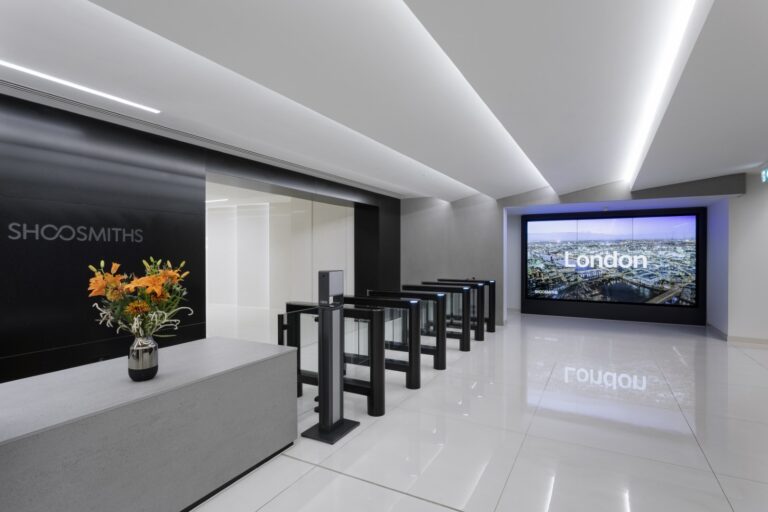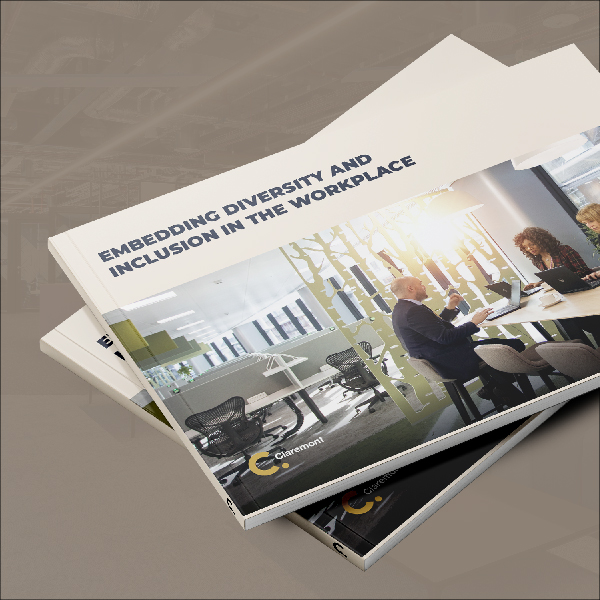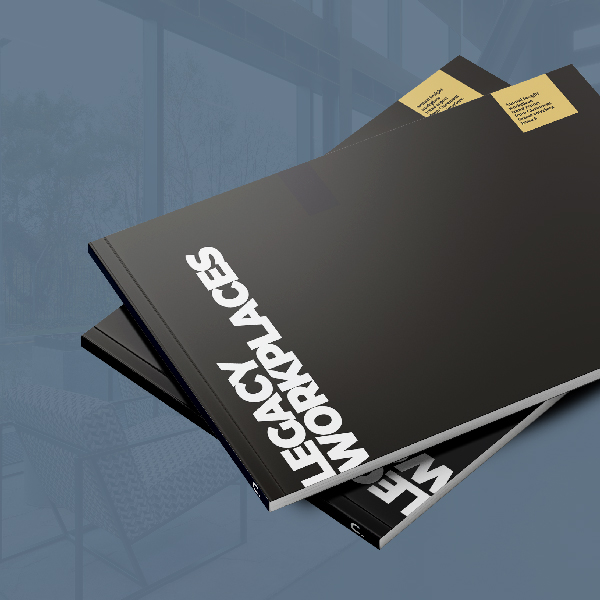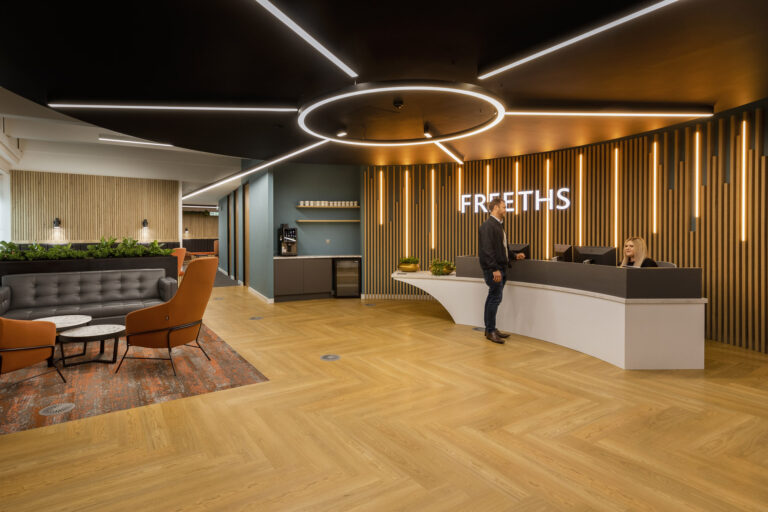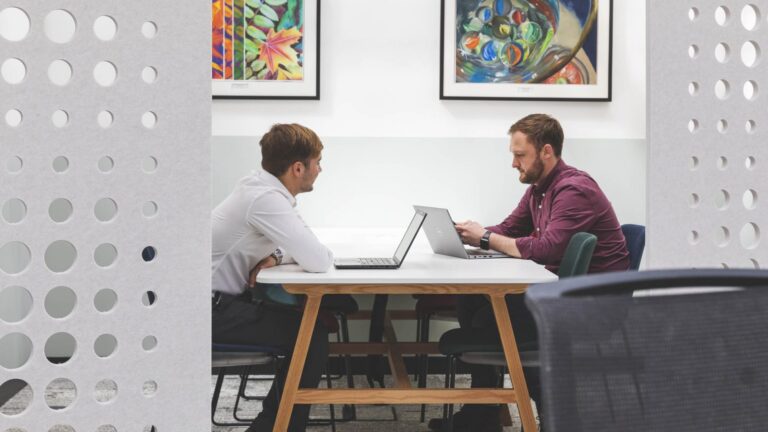
Don't Reduce Legal Salaries – Reduce Your Office Footprint.
Date
30 May 2022
Read length
6 min
For the legal sector – where talent attraction, engagement and retention are a top priority – reducing office square footage is providing a cost neutral way to overhaul office interior design and cater for employees’ new needs, particularly in the wake of Covid.
Almost a third of businesses are planning to reduce their office space in response to new hybrid ways of working[1] and interestingly – they are also the most likely to invest the most in upgrading their workplaces through office interior design. It’s also a strategy which if approached properly, can reduce overheads significantly and deliver greater organisational flexibility in the longer term.
Here, Becky Turner from Claremont shares the three primary reasons why reducing office space is much better than reducing legal salaries, as well as why refreshing office interior design is good for legal business.
Opportunity to respond to new behaviours
Lots of legal firms are ditching ‘trophy’ offices, in favour of workspaces that better reflect employees’ new working behaviours, wants and needs. Part of this is about thinking what legal firms need for their people to thrive, rather than just to look good. This is a process best started with workplace consultancy as it seeks to find the optimal combination of people, space and technology for legal firms to perform to their best. Swathes of desking and expansive client suites are no longer enough – legal offices must offer more task-based as well as collaborative experiences so that knowledge sharing, and social connections are forged.
By rethinking the workplace and approaching office interior design from the perspective of how work is done, and what will make people come together under one roof – it’s possible to give staff even more purpose and drive. Interestingly research from Gensler[1] showed that access to outdoor spaces is an increasingly important requirement when in the office, as is the need for less densely occupied offices[2] and private spaces[3]. This need for privacy might feel at odds with the push for greater collaboration – but it’s unlikely that employees will come into the office for collaboration alone. Private spaces, be they quiet pods for lone working or individual desks, still have an important role to play.
Save money through real estate – today and tomorrow
Lockdown should make legal firms revaluate what they need from their real estate – rather than what they’re prepared to pay their staff. Top London firm Stephenson Harwood recently came under fire for suggesting it would pay staff 20% less if they chose to work from home permanently. While their motivations seem to be in response to recruiting staff from outside London and reflecting different salary expectations – it has brought the financial ramifications of hybrid working to the fore.
For many forward-thinking legal firms, the pandemic has prompted a rethink about space. Why occupy 100,000 sq. ft of prime city centre space for 500 staff if only 40% of them will ever be in the office together, or if a hub and spoke model would better suit your legal firm.
By getting under the skin of new hybrid behaviours – it’s possible to reduce square footage and therefore overheads significantly. We’ve helped numerous legal firms to achieve these gains. Through workplace consultancy and creative interior design one legal firm was able to reduce space by 7,000 sq. ft, which delivered a saving of £1.2m over five years. Another legal firm was able to halve their office space through greater adoption of agile practices, which unlocked a substantial £9m saving over a five-year lease. And when legal firms choose to close offices altogether thanks to new working practices – the financial savings are similar – often to the tune of £1m per year.
Create memorable employee experiences.
Positive and memorable employee experiences are powerful, and research shows that happy employees are typically more motivated, productive, loyal, and profitable.
Reducing office space and investing in smaller more diverse, activity-led workspaces creates an opportunity to revisit the employee experience and ensure its helping to nurture happy employees. This involves taking a close-up look at workplace culture and what it takes to make people feel they belong – all crucial components when creating a Destination Office – that is creating somewhere that offers the experiences, feelings and facilities that either previous office space didn’t deliver, or they can’t get by working remotely.
Whether your legal firm is looking to dramatically reshape its property portfolio, downsize one office or sublet un-used space, the opportunity to unlock significant cost savings remains the same. However, there is even more commercial benefit in using space reduction to promote greater employee engagement. In the post Covid era, legal firms must harness the power of office interior design for it can deliver a positive return to the office, a happy, healthy, and motivated workforce and significantly reduced overheads.
[1] Research by the Gensler Research Institute as quoted here: https://www.wealthmanagement.com/office/what-do-office-employees-want-it-s-not-what-you-think
[2] Research by JLL as quoted here: https://www.wealthmanagement.com/office/what-do-office-employees-want-it-s-not-what-you-think
[3] Research by Steelcase as quoted here: https://www.wealthmanagement.com/office/what-do-office-employees-want-it-s-not-what-you-think
[1] According to a global survey by ISS as quoted here: https://www.fmj.co.uk/the-office-is-being-repurposed-on-a-global-scale-finds-iss-survey/
See how we could help with your new office interior design or office design and build project here
Get in touch
We love nothing better than talking all things workplace and design – got a question, potential project or just need some guidance?
Drop us a note…


